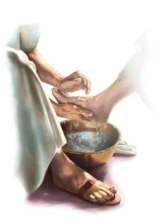 “Not so shall it be among you; but whoever wishes to be great among you must be your servant, and whoever desires to be first among you must be your slave…”– Matt 20:26-27 AMP
“Not so shall it be among you; but whoever wishes to be great among you must be your servant, and whoever desires to be first among you must be your slave…”– Matt 20:26-27 AMP
This statement from Jesus comes on the heels of some bickering and contention between the disciples after the mother of James/John (Sons of Zebedee) requests her sons be given a seat of honor next to Jesus. Jesus informs her that it is not His decision to make… and the other 10 disciples react against the two brothers with indignation (vs 24).
At this reaction, Jesus takes the opportunity to speak into the lives of His disciples. It is clear that Satan is attempting to disrupt the mission by sowing discord among the disciples. So Jesus draws up a picture of the true posture of a disciple – one of a servant and a slave.
A servant is a diakonos – “one who executes the commands of another” – such as:
- A servant of kings (Matt 22:13)
- A servant at feasts (John 2:5;9)
- An officer in civil government (Rom 13:4)
- Those who serve in church (Matt 23:11; Mark 9:35; Rom 16:1)
- Deacons/Elders in church (Phil 1:1; 1 Tim 3:10-13; Acts 6:1-7)
- Used to describe Jesus (Rom 15:8; Gal 2:17; Matt 4:23-24; 9:35; Acts 10:38)
- Used to describe Pastors (Matt 20:26; Mark 10:43)
- Also describes servants of Satan as a counterfeit to true servants of God (2 Cor 11:15)
A slave is a doulos – “one giving himself wholly to anothers will” – such as:
- Bondslaves (Gal 3:28; Eph 6:8; Col 3:11)
- Servants to kings (Matt 18:23-26; 23:1-14)
- Civil Officers (John 18:18)
- Sinners who serve sin (John 8:34; Rom 6:16-22; 2 Pet 2:19)
- All disciples of Christ (Matt 10:24-25; Rom 6:16-22; Rev 19:5)
- Christ, the servant of God (Phil 2:7; Isa 42:1)
- Moses and the prophets (Heb 3:5; Rev 10:7)
Both of these categories of servants/slaves were listed in the bottom tier of society. They had no rights of their own (apart from those given them by their owners). They represent individuals who (both voluntarily and involuntarily) have offered their lives to the service of another. The owner was responsible for the servants’ well-being, provision, upkeep, protection, etc.
Jesus modeled this type of life Himself.
When we hear the invitation of salvation from Jesus – we hear a call into a brand new type of life. By accepting that call we take on the new name of “Christian”, and become a servant/slave to God. This means we give up our rights – our demands – our insistence toward our own way. This means we adopt the lifestyle of the one who purchased us (Jesus) – looking to Him alone for our sustenance, provision, protection, etc.
True Christianity involves becoming a disciple of Jesus – a servant/slave. It isn’t a suggestion from Jesus – it is a command. It includes pastors, politicians, truck drivers, electricians, house wives, lawyers – everyone.
- There is no such thing as a Christian who does not serve.
- There is no such thing as a Christian who looks to their own needs before those of others.
- There is no such thing as a Christian who simply attends a church.
- There is no such thing as a Christian who comes late and leaves early.
- There is no such thing as a Christian who has no relationship with other Christians.
- There is no such thing as a Christian who does not serve.
So… are you a servant and a slave?
Be Fruitful & Multiply,
PK


